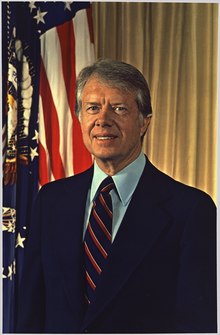6.Jimmy Carter
James Earl "Jimmy" Carter Jr. (born October 1, 1924) is an American politician who served as the 39th President of the United States from 1977 to 1981. In 2002, he was awarded the Nobel Peace Prize for his work with the Carter Center.
Carter, a Democrat raised in rural Georgia, was a peanut farmer who served two terms as a Georgia State Senator, from 1963 to 1967, and one as the Governor of Georgia, from 1971 to 1975. He was elected President in 1976, defeating incumbent President Gerald Ford in a relatively close election; the Electoral College margin of 57 votes was the closest at that time since 1916.
On his second day in office, Carter pardoned all evaders of the Vietnam War drafts. During Carter's term as President, two new cabinet-level departments, the Department of Energy and the Department of Education, were established. He established a national energy policy that included conservation, price control, and new technology. In foreign affairs, Carter pursued the Camp David Accords, the Panama Canal Treaties, the second round of Strategic Arms Limitation Talks (SALT II), and the return of the Panama Canal Zone to Panama. On the economic front he confronted persistent "stagflation", a combination of high inflation, high unemployment and slow growth. The end of his presidential tenure was marked by the 1979–1981 Iran hostage crisis, the 1979 energy crisis, the Three Mile Island nuclear accident, and the Soviet invasion of Afghanistan. In response to the Soviet move he ended détente, escalated the Cold War, and led the international boycott of the 1980 Summer Olympics in Moscow. By 1980, Carter's popularity had eroded such that, running for re-election that year, he was challenged by Senator Ted Kennedy in the Democratic Party's primaries for the presidential nomination, marking the most recent Democratic primary in which an incumbent faced serious opposition. Carter won the 1980 primary with 51.13% of the vote (all incumbent candidates since have won at least 72.8% of their party's primary votes) but lost the general election in an electoral landslide to Republican nominee Ronald Reagan, who won 44 of 50 states.
His presidency has drawn medium-low responses from historians, with many considering him to have brought greater accomplishment with his post-presidency work. He set up the Carter Center in 1982 as his base for advancing human rights. He has also traveled extensively to conduct peace negotiations, observe elections, and advance disease prevention and eradication in developing nations. Additionally, Carter is a key figure in the Habitat for Humanity project. He has been the longest-retired president in American history since September 2012, when he surpassed Herbert Hoover. He is also the first president to mark the 40th anniversary of his election and inauguration.
Regarding current political views, he has criticized some of Israel's actions and policies in regards to the Israeli–Palestinian conflict and has advocated for a two-state solution. He has vigorously opposed the Supreme Court's decision in Citizens United v. FEC to strike down McCain-Feingold limits on campaign spending by corporations and unions, saying that the U.S. is "no longer a functioning democracy" and now has a system of "unlimited political bribery." He supported former President Barack Obama during his time in office but was critical of aspects of his foreign policy, particularly with regard to the use of drones and Obama's failure to close Guantanamo Bay detention camp.


No comments:
Post a Comment